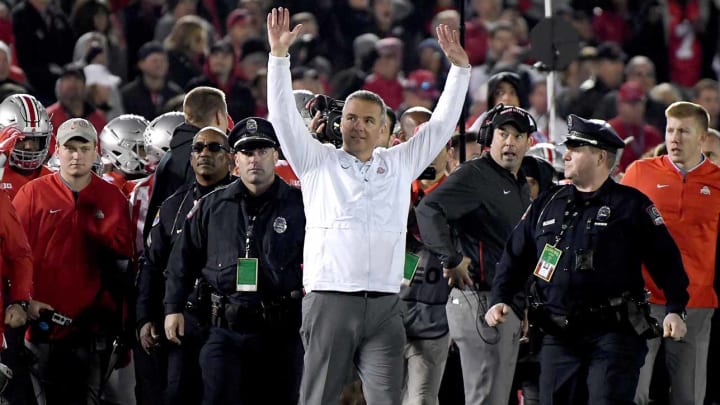Ohio State's Rose Bowl Win Ends Urban Meyer's Final Season on a Complicated High Note

It had been nine years since Ohio State played in its last Rose Bowl. Two tumultuous years later, the Buckeyes hired Urban Meyer to lead them back to the heights Jim Tressel had in the 2000s, and now one of college football’s most storied programs is on the verge of another monumental change. The 28–23 victory over Washington, the Pac-12 champion that looked completely overmatched in the face of the Buckeyes, was Urban Meyer’s final game as Ohio State’s coach, and his final game ever on a sideline, he maintains. After the game, Meyer reinforced his retirement, telling ESPN that he doesn’t believe he will coach again.
During Meyer’s seven-year tenure in Columbus, the Buckeyes played in a bowl every season they were eligible. (The program ran the table in 2012, his first season, when it was ineligible for postseason play as part of the NCAA sanctions that led to Tressel’s firing.) Meyer’s teams won every bowl game but two (both losses came against Clemson) and with Tuesday’s win, the three-time national champion coach will go out on a high note after a bizarre and ultimately disappointing season that saw the Buckeyes destroy the game’s best defense, Michigan, but only after getting blown out themselves by a mediocre Purdue team.
The Buckeyes were close to perfect in the first half, going into the locker room up 21–3. But in a microcosm of the 2018 season, they let up in the second half, allowing 20 fourth-quarter points before eventually locking down and securing the win with an interception in the end zone on Washington’s two-point conversion attempt that would have cut the deficit to three. Ohio State’s defense was lights-out in spurts but never quite consistent, and lead running back J.K. Dobbins had a quiet day, finishing with just 24 yards. Quarterback Dwayne Haskins was as consistent as he’s been all year, completing 25 of 37 passes for 251 yards and three touchdowns.
Haskins has yet to officially reveal his plan for 2019, and his decision about the NFL will go a long way in determining how different next season feels in Columbus without Meyer. Reports indicated that Haskins planned to announce his departure soon after the game, leaving offensive coordinator Ryan Day, who takes over as head coach, with his first test: replacing one of the nation’s best quarterbacks. Haskins finished third in the Heisman voting this year, and in the regular season, he completed more than 70% of his passes for 47 touchdowns and just eight interceptions.
Despite Haskins’s decorated season and Tuesday’s triumph, Ohio State’s season will go down as the second straight in which they’ve fallen short of expectations in similar fashion, missing the College Football Playoff after winning the Big Ten title. Meyer’s past two teams, though loaded with talent, were plagued by inconsistency, suffering blowout road losses to mediocre teams at inopportune times which ultimately led to College Football Playoff snub. This season was also marred by off-the-field mismanagement, stemming from Meyer’s lies at Big Ten media days about his knowledge of former assistant coach Zach Smith’s record of domestic violence allegations. Meyer was suspended for his actions—and inaction—and once he returned to the sideline, he dealt with health issues stemming from an arachnoid cyst on his brain that he has known about and managed for years. Since Meyer announced his intentions to retire in December, any and all discussion of his legacy has been a tricky proposition, weighing his .853 winning percentage against his lapses in appropriate program oversight. After the Rose Bowl, when asked to parse his legacy, Meyer spoke of the struggles of this season, referencing Nick Bosa’s season-ending injury and some of the team’s other struggles—along with, in his words, “the stuff in the summer.”
That Meyer would choose to bring up the scandal and his suspension is odd, and it was disheartening to see how flippantly he tossed it into the interview, part and parcel with mundanities of the game like injuries and upsets. Once retired, Meyer will stay on at Ohio State as an assistant athletics director and professor of character and leadership, two positions that his actions over this past season should have automatically disqualified him from.
In the end, it’ll be impossible to separate Meyer’s coaching genius from his problematic behavior off the field, both at Ohio State and at Florida, where he won his first two national championships. He’s linked to some of the best players in the game at both the college and NFL levels and was instrumental in launching their careers, but his legacy and future on the periphery of the game stands as a testament that at the highest levels of college football, winning trumps accountability.

Staff writer Joan Niesen returned to SI in 2014 after first coming to SI as an intern while in graduate school. She covers college football and the NFL.